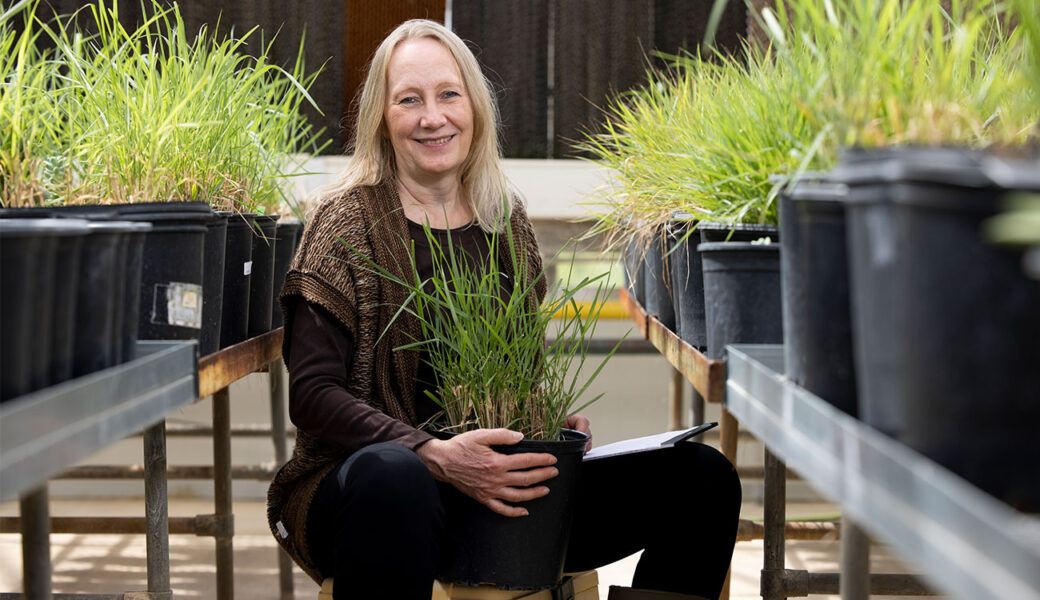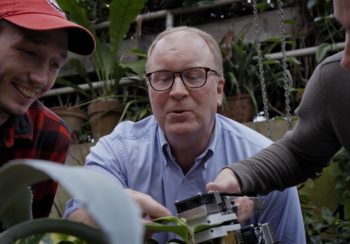Researchers in UGA’s Complex Carbohydrate Research Center have discovered a gene that synthesizes pectin and other important polysaccharides in plant cell walls, a breakthrough that can be applied to practices like biofuel production and agricultural sciences.
The enzyme synthesizes a polymer called rhamnogalacturonan I (RG-I) and allows researchers to further study in-vitro pectin synthesis, a key to understanding how plants grow and plant cells adhere to one another. By identifying this gene, researchers can investigate what pectin variations would look like and make modifications on the genetic level, potentially increasing biomass yields.
“RG-I enzymes, for example, play a significant role in poplar trees and switchgrass, which are currently being investigated as sources of carbon for biofuels,” said Debra Mohnen, Distinguished Research Professor of biochemistry and molecular biology at CCRC and the Franklin College of Arts & Sciences, and lead author on the study. “We have prior evidence that by modifying the amount of pectin produced in the plants, we can make them grow larger and increase the yield of that plant biomass.”
RG-I also affects the ability to separate cells, a requirement for obtaining carbon from plant tissues for production of biofuels. Increasing biofuel production can help shrink the carbon footprint in industries like transportation, reducing harmful greenhouse-gas emissions.
Lead author Robert Amos, a postdoctoral researcher in Mohnen’s lab, further explained why this particular enzyme may be relevant to modifying plants on the genetic level.
“If you’re looking at gene targets that are important for plant growth that would be relevant to biofuel production, it’s useful to have a scientific basis for choosing those gene targets,” Amos said. “As a result of this work, we now know this gene is involved in synthesis of the cell wall’s polysaccharides, and that creates another available target for genes that might be relevant for biofuel efforts.”
Only plant cells have cell walls—animal cells do not—and hence the polymers made in these cell walls are unique to plants. To help researchers understand and modify plants to promote environmental sustainability, Mohnen said they must first understand how plant cell polymers are made and the genes that synthesize them.
“In this lab, we do a lot of biochemistry, which involves mixing enzymes and polysaccharides in a tube and showing the activities,” Amos said. “But there are also mutant studies, where you introduce a mutation into a single gene and study the biological changes that result.”
It was just one such mutant study that eventually led the researchers to their discovery. Previous published work showed that a mutant in this gene reduced the amount of that polysaccharide.
“That gave us a clue as to the candidate gene that has this function,” Amos said.
Instead of needing to study thousands upon thousands of plant genes, researchers had narrowed it to just one. And now, knowing the gene’s role in synthesizing pectin, researchers can apply this method to studying related genes in plants.
“There are multiple genes that are similar to this in all plants, and we predict that some of those other ones will make this polymer in certain types of tissues and cells,” Mohnen said. “Maybe some of these genes make the RG-I in fruits, and maybe understanding that gene will help us identify variants that make better foods in agriculture.”
Mohnen and Amos said this project, which is funded by grants from the U.S. Department of Energy, is foundational for more targeted scientific research beyond impacts to biofuel.
“There’s been a lot of work on the role of pectin in human health, but it’s not conclusive,” Mohnen said. “Pectin has shown to have important roles in our intestinal system and affect the microbes that live there, but we don’t know what parts are caused by RG-I or other parts of pectin.”
Regarding human health, Amos said there is a lack of research in the role of pectin in dietary fiber compared to other macronutrients. However, polysaccharide research could eventually enable collaborative studies in the future.






